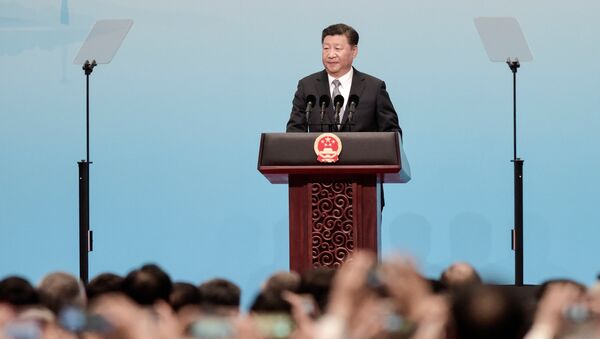XIAMEN (China) (Sputnik), Anastasia Levchenko — The ninth summit of the BRICS leaders has resumed with China hoping that its venue, the coastal port city of Xiamen, will become a starting point for the bloc’s journey to a new era of its "Golden decade" and an ever-close partnership.
September 3-5 has seen joint sessions and bilateral meetings of the five leaders of the BRICS countries — Brazilian President Michel Temer, Russian President Vladimir Putin, Indian Prime Minister Narendra Modi, Chinese President Xi Jinping and South African President Jacob Zuma. Business Forum and Dialogue with Emerging Markets – namely, Egypt, Guinea, Mexico, Tajikistan and Thailand – took place on the sidelines.
"BRICS cooperation has traversed a glorious journey of one decade. Though separated by mountains and oceans, our five countries have been closely bound by a shared commitment to win-win cooperation," Xi said at the plenary session on Monday.
"Let us set sail from Xiamen and join hands to usher in the second ‘Golden decade’ of BRICS cooperation and deliver greater benefits to the people of our five countries and around the world," he continued.
The heads of state did join hands – during the traditional leaders’ photo ceremony and, to a certain extent, in the final declaration of the Xiamen summit.
On the political and security side, the BRICS leaders called for the establishment of a genuinely broad counterterrorism coalition with the UN playing the central role in it; called for the reforms of the multilateral governing institutions (the UN, IMF); condemned practices of unilateral military interventions and economic sanctions and reiterated that weapons shall not be placed in outer space.
They mentioned Syrian, Yemeni, Afghan and Israeli-Palestinian crises in the declaration, expressing hope for the soonest normalization.
However, the one that was most closely watched – the crisis on the Korean Peninsula – was just briefly mentioned in the declaration.
"We strongly deplore the nuclear test conducted by the DPRK. We express deep concern over the ongoing tension and prolonged nuclear issue on the Korean Peninsula, and emphasize that it should only be settled through peaceful means and direct dialogue of all the parties concerned," the document reads.
The summit started on Sunday in the shadow of the sixth and the most powerful so far nuclear test by North Korea. On September 3, Pyongyang claimed that it had successfully tested a hydrogen bomb that could be loaded onto an intercontinental ballistic missile, which caused fierce international condemnation.
New nations on board
This year, the summit was held in a BRICS Plus format, proposed by the Chinese presidency in January 2017. The leaders of Egypt, Guinea, Mexico, Tajikistan and Thailand arrived in Xiamen to hold bilateral meetings on the sidelines and a joint "Dialogue with Emerging Markets" discussion with the BRICS leaders.
The Xiamen Declaration set forth that the bloc "will strive towards broad partnerships with emerging markets and developing countries, and pursue equal-footed and flexible practices and initiatives for dialogue and cooperation with non-BRICS countries, including through BRICS Plus cooperation."
Possible storms ahead
Apart from the looming escalation on the Korean peninsula, just in the vicinity of two members of the bloc — Russia and China, there are some other "storms" that BRICS may face in future.
Thus, Chinese-Indian border confrontation in the Doklam area, though frozen for the period of the summit and never mentioned on its sidelines, has all chances to flare again.
Storms can also come in their natural form. Thus, a powerful tropical typhoon Mawar landed in the coastal areas of south China on Sunday, having prompted the State Flood Control and Drought Relief Headquarters to activate a level III emergency response, and local authorities in a number of provinces, including Fujian, where Xiamen is located, to take precautions.
Heavy showers kept chasing the participants of the Xiamen summit both Sunday and Monday. The last day, however, turned out to be sunny.
"We BRICS leaders are determined to take Xiamen summit as a new starting point to work even harder for a closer and more strategic partnership and another ‘Golden decade’ of BRICS cooperation," Xi said in his closing remarks on Tuesday.
South Africa will take over the presidency of BRICS after China. Next summit will be held in Johannesburg.


